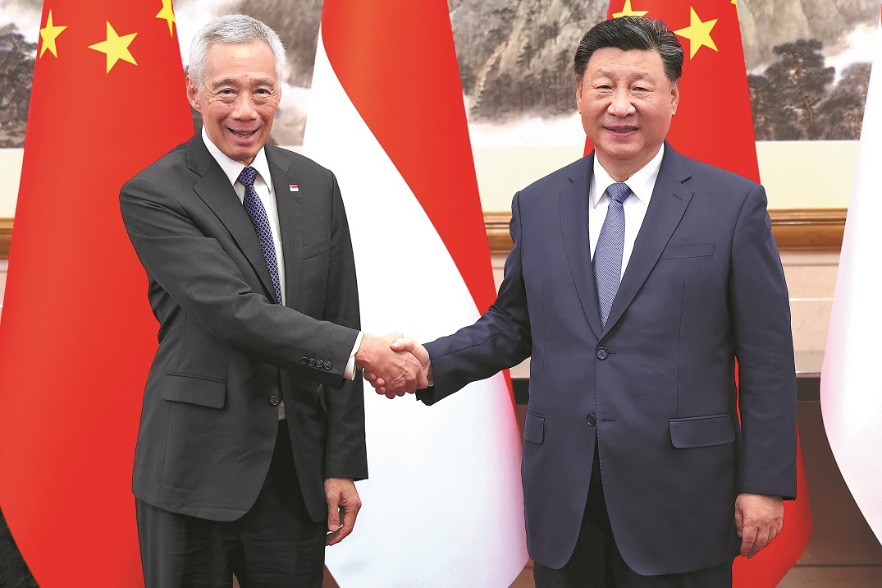Pucksters prove doubters wrong
After a string of stirring displays, China has won plenty of fans and vindicated its Olympic inclusion


Born in Canada to a family with Chinese heritage, hockey brothers Spencer and Parker Foo could never have imagined that one day their names would go down in the ice hockey history of their ancestors' native country.
Not until last week, that is, when they took to the ice at the Beijing Winter Olympics representing China on the biggest stage of their careers.
Team China qualified automatically as the host nation, but its brave fight against three heavyweight group opponents-the United States, Germany and Canada-in its Olympic debut proved it belongs at this level.
"It probably ranks No 1 among all my career highlights," Parker said after he scored the Chinese men's team's first goal at the Olympics in a 3-2 loss to Germany on Saturday.
"It's an honor to be the guy who puts it in the back of the net for the first time. But all the credit goes to our entire organization, it goes to our entire team, to all of China," said the 23-year-old native of Edmonton, Alberta, who goes by the Chinese name Fu Shuai at the Olympics.
Spencer, who has the Chinese name Fu Jiang emblazoned on the back of his jersey, said ever since he was pitched the idea of suiting up for China, he's been working hard and visualizing the proud moment.
"Not a lot of people get the chance to represent where their family came from. It's in your blood. It's pretty special," said Spencer, who played 23 minutes, the most on either team except for the goaltenders, in China's 8-0 loss to the United States on Thursday.
"When you have your country's name on your chest, the stakes are a little higher and you want to come out and play really hard," he added.
"We didn't want the result out there, but nevertheless it's really special to come out here and represent your country in the Olympics."
The Foo brothers are among over a dozen overseas talents, comprising either college graduates or ex-NHL veterans, who were drafted at tryout camps organized by the Chinese Ice Hockey Federation and its partner club Kunlun Red Star as early as 2017.
After playing with Kunlun in the Russia-based Kontinental Hockey League for at least two seasons, most of the North American-born players earned eligibility to represent China due to their heritage and after completing minimum-stay requirements in their adopted country's pro system.

Entering the Olympic tournament with concerns over its level of play, the 32nd-ranked Chinese team's brave displays have not only earned respect from higher-profile rivals but also vindicated the International Ice Hockey Federation's decision to grant the host an automatic berth at the Games as a way of promoting the sport in the world's most populous nation.
The way the Chinese players fought back hard in their narrow loss to 2018 silver-medalist Germany, and how they stood up to the US team physically (especially during the first period when they conceded just one goal), had hundreds of home fans off their seats and cheering at the National Indoor Stadium.
"It means a lot for everybody, the individuals that scored, the team, and most important that China should be proud of this group for the way they performed," head coach Ivan Zanatta said of his men's two-goal performance, with the second score fired by Wang Taile, against Germany.
"My message from day one was we want to gain worldwide respect and that's what we did tonight," added Zanatta, who played at the 1992 Winter Olympics representing Italy.
Although losing all three preliminary-round games to finish bottom of Group A, China will continue to fight for a quarterfinal spot on Tuesday in the playoff qualifying round against one of the second-ranked teams from the other two groups.
Despite facing long odds to advance, China's appearance has already been inspirational enough for future generations to dream big, according to defenseman Chen Zimeng, one of four Beijing natives on the Chinese team.
"We're the groundbreakers and our goal is to play as hard as we can to make our country proud," said Chen, who started playing hockey as a 6-year-old at a downtown shopping mall in Beijing before later developing his skills in the North American junior system.
"At the same time, we want to encourage more children to pick up hockey sticks and skate, and maybe they are able to represent China again at future Olympics," added the 24-year-old, who received a full scholarship in 2018 to play with the University of Alabama-Huntsville in the NCAA Division 1 system.
Thanks to the Olympic exposure, the already burgeoning grassroots hockey scene in Beijing, underlined by the rapid development of a minor league, is expected to take off to new heights.
"That's what we're here for," said 36-year-old team captain Ye Jinguang, known as Brandon Yip in his native Canada.
"If we see a couple of boys and girls watching us play and they start to pick it up and start growing this sport here, that's definitely mission accomplished for us."
Most Popular
- Ethnic harmony showcased beyond sports
- Cavs get 17th win as Celtics edge T-Wolves and Heat burn in OT
- Mbappe misses penalty as Liverpool exact revenge on Real Madrid
- Milano Cortina 2026 unveils torch relay time, routes
- FIVB new president Azevedo foresees bright future of volleyball
- Lewandowski reaches landmark as Barca breezes past Brest






























